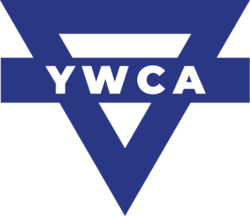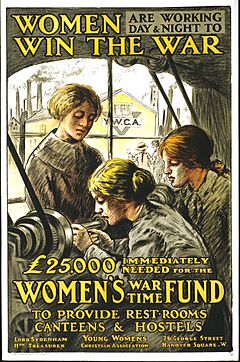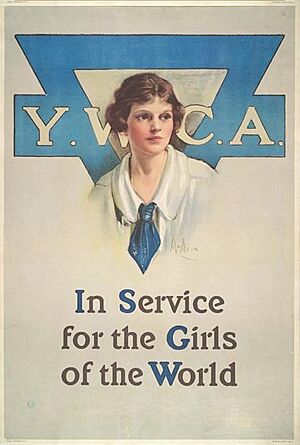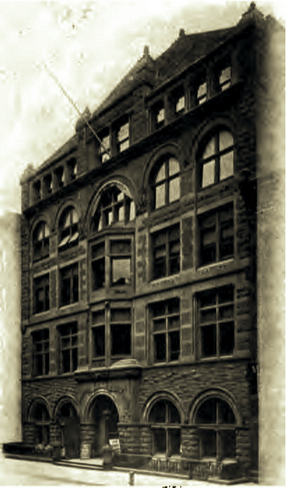YWCA facts for kids
 |
|
| Founded | 1855 |
|---|---|
| Founder | Mary Jane Kinnaird Emma Robarts |
| Founded at | London, United Kingdom |
| Headquarters | Le Grand-Saconnex, Canton of Geneva, Switzerland |
|
Region
|
Worldwide |
The Young Women's Christian Association (YWCA) is a global group that helps women, young women, and girls. It focuses on making them strong leaders and protecting their rights. The YWCA works in over 100 countries around the world.
The main office for the World YWCA is in Le Grand-Saconnex, Switzerland. The YWCA is separate from the YMCA (Young Men's Christian Association). However, some local YWCA and YMCA groups have joined together. They are called YM/YWCAs or YMCA-YWCAs and offer programs from both organizations. For example, Sweden did this in 1966.
Contents
How the YWCA is Organized
The World YWCA has a special group called the World Board. This board includes people from all parts of the YWCA around the world. They help manage what the organization does every day.
Another important group is the World Council. This group makes the big decisions for the World YWCA. They meet every four years to talk about important things. These include rules, plans for the future, and how money will be spent. During these meetings, 20 women are chosen to be part of the World Board.
A Look at YWCA History
The YWCA started way back in 1855. A kind person named Lady Mary Jane Kinnaird opened a home in London. It was for nurses who were traveling during the Crimean War. This home also helped young women who came from the countryside to work in London factories. It gave them a safe place to live, learn, and get support.
Later, in 1877, Lady Kinnaird's group joined with another group. This second group was started by Emma Robarts. In 1880, the YWCA also began in Australia. Mary Jane Barker helped start it in Sydney.
In 1884, the YWCA changed how it was set up. Before, the London group was almost separate. But after 1884, there was one main YWCA organization. This group helped young women by giving them Christian books and checking on their living conditions. They even ran a restaurant for ladies in London.
The World YWCA was officially created in 1894. The first countries to join were the USA, Great Britain, Norway, and Sweden. The first big world meeting of the YWCA happened in London in 1898. There were 326 people from 77 countries there.
Changes in the Early 1900s
At the start of the 1900s, the YWCA began to change. At first, it mainly focused on helping women with city life and sharing Christian ideas. But new ideas about social fairness started to influence the group.
At a YWCA meeting in Berlin in 1910, a big decision was made. The YWCA decided to study problems in society and factories. They also wanted to teach working women about new laws that could help them. Over time, the YWCA became more focused on social issues. By 1920, it was mostly a non-religious organization, though it kept its name.

Until 1930, the World YWCA's main office was in London. Most of its leaders were British. But in 1930, the office moved to Geneva, Switzerland. This was the same city where the League of Nations was located. This move showed that the YWCA wanted to be more diverse and work with other groups. These groups included the International Committee of the Red Cross and the YMCA.
YWCA During World War II
During World War II, YWCAs in some countries, especially in Eastern Europe, were shut down. But in other places, women worked hard to help their neighbors and people who had to leave their homes.
After the war, the YWCA worked to bring women from different countries together. In 1947, they held their first World Council meeting in almost ten years in Hangzhou. This meeting was important because it was the first one held outside of Western countries. It helped women from countries that had been enemies during the war to meet. It also showed Western YWCAs that war had caused damage far beyond Europe.
In the years that followed, the World YWCA focused on many important issues. These included helping refugees, dealing with health problems like HIV and AIDS, and improving literacy. They also worked on women's and girls' human rights, fighting poverty, and helping with education. They also focused on peace, stopping violence, and training young women to be leaders. These issues are still very important to the World YWCA today.
YWCA Programs
YWCA Week of Prayer
Since 1904, the World YWCA and the World Alliance of YMCAs have asked people to pray together. This happens during the Week of Prayer and World Fellowship. During this week, both groups pray and work on a special topic. This helps them feel connected to members and partners all over the world. The week includes a Bible study based on that year's theme.
World YWCA Day
In 1948, World YWCA's Observance Day began. It helped each member see how they could act locally based on the year's theme. Some past themes included "My Faith and My Work" and "My Contribution to World Peace." In 1972, the name changed to World YWCA Day. It is now celebrated every year on April 24.
YWCAs Around the World
The YWCA is active in over 100 countries. It has groups in eight main regions around the globe. Many local YWCAs work on their own but are part of their country's national YWCA.
Europe
The European YWCA includes groups in Belarus, Belgium, Denmark, Great Britain, Norway, and Romania, among others. This European group helps connect the national YWCAs across the continent. YWCA Scotland now uses the name The Young Women's Movement.
Middle East
In the Middle East, YWCAs are found in Egypt, Jordan, Lebanon, and Palestine.
Africa
There are more than 20 national YWCAs helping communities across Africa. These include groups in Burkina Faso, Malawi, South Africa, and Togo.
Asia
The YWCA is present in many Asian countries. These include Bangladesh, China, India, Korea, Nepal, Taiwan, Philippines, and Thailand. Sophia Cooke started the Young Women's Christian Association in Singapore in 1875.
Pacific
National YWCAs in the Pacific region include New Zealand, Australia, Papua New Guinea, Solomon Islands, Fiji, and Samoa. In 1878, activists in Dunedin started the first YWCA in the southern half of the world. The YWCA in Christchurch began in 1883 to help visit sick people. In 1885, the Auckland group started, focusing on providing safe homes for working girls. YWCA Australia began in 1880 in Sydney to help women who had moved there.
North America
In North America, the YWCA is in the United States and Canada. YWCA USA started in 1858. Today, it has over 200 local groups that help more than 2 million women, girls, and their families. YWCA USA is one of the biggest providers of programs and shelters for domestic violence in the United States. YWCA Canada started in 1870. Today, it has over 30 groups that help 1 million women, girls, and their families.
YWCA USA's main office is in Washington, DC. It used to be in the Empire State Building in New York City.
Caribbean
National YWCAs in the Caribbean region include Barbados, Grenada, Haiti, and Trinidad & Tobago.
Middle and South America
YWCAs in Latin America include groups in Argentina, Belize, Bolivia, Brazil, Chile, Colombia, Honduras, and Suriname.
YWCA Leaders Over Time
The YWCA has had many important leaders since it began in 1855.
| Name | Country | Year |
|---|---|---|
| Mrs. J. Herbert Tritton | United Kingdom | 1898–1902 |
| Mrs. George Campbell | United Kingdom | 1902–1906 |
| Miss Mary Morley | United Kingdom | 1906–1910 |
| Mrs. J. Herbert Tritton | United Kingdom | 1910–1914 |
| The Hon. Mrs. Montague Weldgrave | United Kingdom | 1914–1924 |
| The Rt. Hon. The Baroness Parmoor | United Kingdom | 1924–1928 |
| The Hon. Mrs. Montague Weldgrave | United Kingdom | 1928–1930 |
| Miss C. M. Van Asch Van Wijck | Netherlands | 1930–1938 |
| Miss Ruth Rouse | United Kingdom | 1938–1946 |
| Miss C. M. Van Asch Van Wijck | Netherlands | 1946–1947 |
| Miss Lilace Reid Barnes | USA | 1947–1955 |
| The Hon. Isabel Catto | United Kingdom | 1955–1963 |
| Dr. Una B. Porter | Australia | 1963–1967 |
| Mrs. Athena Athanassiou | Greece | 1967–1975 |
| Dame Nita Barrow | Barbados | 1975–1983 |
| Mrs. Ann Northcote | Canada | 1983–1987 |
| Dr. Jewel Freeman Graham | USA | 1987–1991 |
| Mrs. Razia Ismail Abbasi | India | 1991–1995 |
| Mrs. Anita Andersson | Sweden | 1995–1999 |
| Ms. Jane Lee Wolfe | USA | 1999–2003 |
| Ms Mónica Zetzsche | Argentina | 2003–2007 |
| Susan Brenan | Australia | 2007–2011 |
| Deborah Thomas-Austin | Trinidad and Tobago | 2011–2019 |
| Mira Rizeq | Palestine | 2019–pres. |
| Name | Country | Year |
|---|---|---|
| Miss Annie Reynolds | USA | 1894–1904 |
| Miss Clarissa Spencer | USA | 1904–1920 |
| Miss Charlotte T. Niven | USA | 1920–1935 |
| Miss Ruth Woodsmall | USA | 1935–1947 |
| Miss Helen Roberts | United Kingdom | 1947–1955 |
| Miss Elizabeth Palmer | USA | 1955–1978 |
| Miss Erica Brodie | New Zealand | 1978–1982 |
| Mrs. Ruth Sovik | USA | 1982–1985 |
| Miss Ellen Clark (acting) | USA | 1985–1986 |
| Mrs. Genevieve Jacques (acting) | France | 1986–1987 |
| Mrs. Elaine Hesse Steel | New Zealand | 1987–1997 |
| Dr. Musimbi Kanyoro | Kenya | 1998–2007 |
| Mrs. Nyaradzai Gumbonzvanda | Zimbabwe | 2007–2016 |
| Ms. Malayah Harper | Canada | 2016–2019 |
| Mrs. Casey Harden | USA | 2019–pres. |
YWCA Partners
The World YWCA is part of the Big Six Alliance of Youth Organizations. This group includes the World Alliance of Young Men's Christian Associations, the World Organization of the Scout Movement, and the World Association of Girl Guides and Girl Scouts. It also includes the International Federation of Red Cross and Red Crescent Societies and The Duke of Edinburgh's International Award Foundation.
The World YWCA also works with other groups like Accountable Now and ACT Alliance. It also has a special role with the United Nations Economic and Social Council (ECOSOC). The World YWCA partners with many religious groups and international organizations.
See also
 In Spanish: Asociación Cristiana de Mujeres Jóvenes para niños
In Spanish: Asociación Cristiana de Mujeres Jóvenes para niños
 | Laphonza Butler |
 | Daisy Bates |
 | Elizabeth Piper Ensley |



